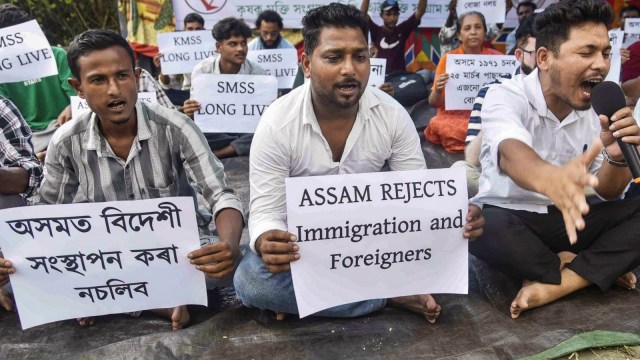ARTICLE AD BOX
 Activists in Assam protest this month’s MHA exemption order for persecuted communities from neighbouring countries. PTI
Activists in Assam protest this month’s MHA exemption order for persecuted communities from neighbouring countries. PTI
The Assam Cabinet Tuesday approved a standard operating procedure (SOP) for the implementation of a 1950 Act which Assam Chief Minister Himanta Biswa Sarma said will empower the state government to bypass the existing citizenship determination process and instead enable District Commissioners to give “suspected foreigners” 10 days to “satisfy” them that they are Indian citizens or issue “evacuation orders” if they are unable to. Currently, the cases of “suspected foreigners” go to Foreigners Tribunals.
In June this year, Sarma announced in the legislative assembly that the Assam government had decided to bring into action the Immigrants (Expulsion from Assam) Act 1950 (IEAA). He had cited an October 2024 judgement by the Supreme Court’s Constitution Bench, which upheld the constitutional validity of Section 6A of the Citizenship Act, which establishes March 24, 1971, as the cut-off date for entry into Assam, meaning that those entering the state after that would be considered “illegal immigrants”.
Following a meeting of the Assam cabinet on Tuesday, Sarma said that the cabinet has now approved an SOP to bring this Act into action, which he said would, to a large extent, “nullify” the role of the state’s Foreigner’s Tribunals.
“According to this SOP, if the DC is informed that someone is a foreigner, or if the border police informs that this person is a foreigner, or if from some other sources we find out that a person is a foreigner, the DC will give that person a notice to prove his citizenship within 10 days. And, if the documents he gives in those 10 days do not satisfy the DC, on the tenth day, the DC will pass an evacuation order. And we will immediately take this person to a holding centre, and from there the BSF will push them back to Bangladesh or Pakistan,” he said.
Saying that the state government has decided to bypass Foreigners Tribunals, he said, “Only a confusing case in which the DC cannot come to a decision, if DC can’t prima facie conclude that the person is a foreigner, will it go to the FT,” he said.
The IEAA 1950 was a legislation drafted by the Union Government of the time, following pressure from the then Assam government about the need for measures to check migration from then East Pakistan in the years following Partition.
The Act stated that if the central government was of the opinion that the stay of any person – who was ordinarily a resident of any place outside India and had come to Assam either before or after the commencement of the Act – in the state “is detrimental to the interests of the general public of India or any section thereof or of any Scheduled Tribe in Assam”, it could direct such a person to “remove himself or themselves” from Assam or India “within such time and by such route as may be specified in the order.”
Story continues below this ad
However, in a little over a month of its coming into effect on March 1, 1950, Jawaharlal Nehru had directed then Assam Chief Minister Gopinath Bordoloi to stop all action under the Act, in the light of the Liaquat-Nehru Act to ensure the security and rights of minorities in the respective territories of Pakistan and India. It has been out of use ever since.
The October 2024 judgement stated that while it found Section 6A to be constitutionally valid, it held the restriction of illegal immigration post-1971 has “not been given proper effect” and issued a set of six directions, including: “The provisions of the IEAA 1950 shall also be read into Section 6A and shall be effectively employed for the purpose of identification of illegal immigrants.”
Under the existing system in the state, the identification and declaration of “foreigners” is done through Foreigners Tribunals.



.png)
.png)
.png)























 English (US) ·
English (US) ·